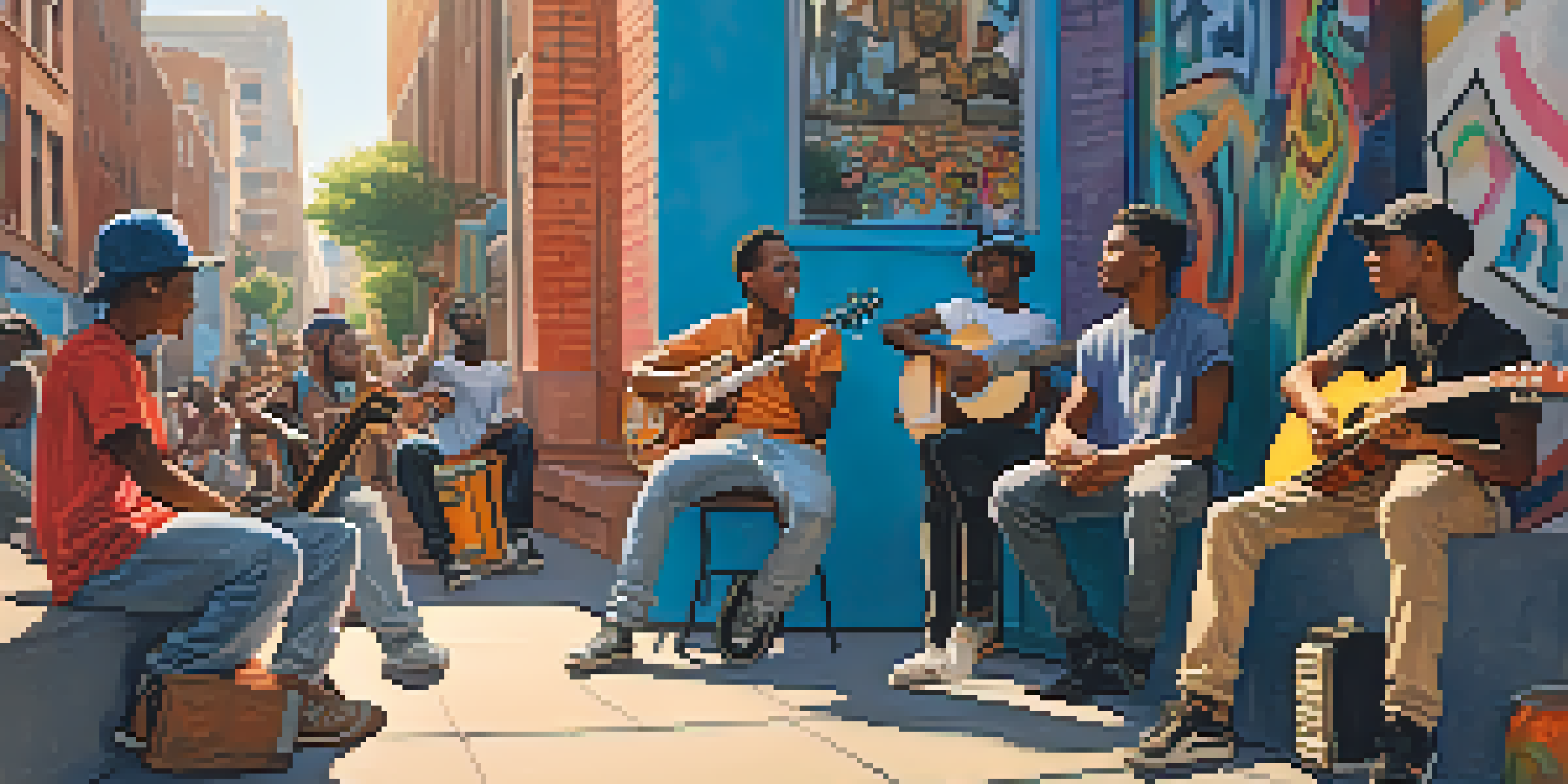The Role of Lyrics in Shaping Youth Values and Beliefs

Understanding the Power of Song Lyrics in Youth Culture
Song lyrics often resonate deeply with young listeners, serving as a reflection of their thoughts and emotions. For many, music becomes a soundtrack to their lives, shaping their experiences and perspectives. Artists express feelings and ideas that might be difficult for youth to articulate themselves, creating a space for connection and understanding.
Music can change the world because it can change people.
Moreover, lyrics can convey messages about love, identity, and social issues, helping young people navigate complex topics. This connection to music often leads to the adoption of values presented in songs, influencing their beliefs and behaviors. As a result, the role of lyrics in youth culture cannot be understated; they often become a guide during formative years.
When young people relate to the themes in lyrics, they feel understood and validated. This sense of belonging can shape their views on various issues, from personal relationships to societal norms. Thus, music acts as both a mirror and a mold, reflecting and shaping youth values in profound ways.
The Influence of Popular Genres on Youth Perspectives
Different music genres carry distinct messages and values that resonate with diverse youth audiences. For example, hip-hop often addresses social justice, identity, and resilience, providing young listeners with narratives that empower them to confront their realities. In contrast, pop music might focus on themes of love and self-acceptance, encouraging positivity and personal growth.

The genre's popularity can amplify its influence, as youth tend to gravitate toward what resonates with their experiences. When artists address contemporary issues in their lyrics, they not only entertain but also educate their audience about important societal topics. This educational aspect can inspire young people to think critically and develop their own beliefs.
Lyrics Reflect Youth Experiences
Song lyrics resonate with young listeners, reflecting their emotions and experiences while helping them navigate complex topics.
Additionally, the way genres evolve can reflect changes in societal values, allowing youth to stay in tune with the world around them. For instance, the rise of socially conscious lyrics in mainstream music reflects a growing awareness and activism among younger generations. This evolution showcases the powerful role music plays in shaping youth perspectives.
Lyrics as a Tool for Identity Formation Among Youth
For many young people, song lyrics are a crucial part of their journey toward self-discovery. Lyrics often articulate feelings of confusion, longing, or rebellion, mirroring the struggles that come with growing up. This connection helps youth form their identities, as they see parts of themselves represented in the music they love.
Lyrics are the way we express our feelings; they are the way we connect with others.
Moreover, the artists themselves can serve as role models, with their lyrics acting as a guiding force. When a young person identifies with an artist's journey, it can inspire them to embrace their uniqueness and explore their own values. In this way, lyrics play an essential role in shaping how youth view themselves and their place in the world.
The impact of lyrics on identity is particularly strong during adolescence, a time when individuals are often searching for belonging. When young listeners find solace in lyrics that resonate with their experiences, it can lead to a deeper understanding of themselves. Thus, lyrics become a powerful tool for personal growth and self-acceptance.
Lyrics and Social Issues: A Catalyst for Change
Many artists use their platforms to address social issues through their lyrics, sparking conversations among youth. Topics like mental health, racism, and climate change are often woven into songs, challenging listeners to think critically about the world around them. This can motivate young people to engage with these issues, fostering a sense of responsibility and activism.
In this way, lyrics can serve as a catalyst for change, pushing youth to advocate for causes they care about. When a song resonates with an issue they face, it can empower them to take action, whether through social media, community involvement, or personal reflection. This engagement can lead to a more informed and active generation.
Music Shapes Identity and Values
Through relatable themes, lyrics play a crucial role in shaping youth identity and values, guiding them toward self-discovery.
Furthermore, the sharing of music that addresses social concerns can create a sense of community among youth. They can bond over shared values and beliefs, reinforcing the idea that they are not alone in their struggles. Thus, lyrics not only inform but also unite young people around common causes.
The Role of Lyrics in Shaping Relationship Values
Lyrics often explore the complexities of relationships, offering insights that can shape youth's understanding of love and friendship. Many young listeners turn to songs to navigate their emotions, learning about the dynamics of romantic and platonic relationships through the narratives presented. This can help them form their own beliefs about what healthy relationships look like.
When lyrics depict themes such as respect, trust, and communication, they set a standard for youth to aspire to in their own relationships. Conversely, songs that glamorize toxic behaviors can also influence young people's perceptions of love and connection. Recognizing these contrasting messages is crucial for youth as they develop their own values around relationships.
Ultimately, the way relationships are portrayed in music can have a lasting impact on how young people interact with others. By reflecting on the messages conveyed in lyrics, they can learn to discern between healthy and unhealthy relationship dynamics. Thus, lyrics can serve as both a guide and a warning in matters of the heart.
The Interplay Between Lyrics and Mental Health Awareness
In recent years, more artists have begun to address mental health struggles in their lyrics, helping destigmatize these important conversations among youth. By sharing their stories through music, they provide validation to those who may feel isolated in their experiences. This connection can encourage young listeners to seek help and support, knowing they're not alone.
Songs that delve into themes of anxiety, depression, and self-acceptance can foster a greater understanding of mental health issues. They can serve as a starting point for young people to discuss their feelings, either with friends or professionals. This open dialogue is essential for fostering a supportive community among youth.
Lyrics Promote Social Awareness
Many artists address social issues in their lyrics, empowering youth to engage with important topics and advocate for change.
The impact of mental health-focused lyrics extends beyond individual listeners; it can also create a ripple effect. As more young people engage with these themes in music, it contributes to a broader cultural shift towards acceptance and understanding. Thus, lyrics play a vital role in shaping attitudes towards mental health in today's youth.
The Future of Lyrics and Youth Values
As music continues to evolve, so too will the messages conveyed through lyrics. The growing diversity of artists and genres means that youth will be exposed to a wider range of perspectives and values. This shift has the potential to foster inclusivity and understanding, allowing young listeners to explore a variety of beliefs and experiences.
Moreover, the rise of digital platforms makes it easier for emerging artists to share their voices, ensuring that youth have access to a plethora of ideas. This democratization of music can lead to richer discussions around values and beliefs, as young people engage with lyrics that resonate with their unique experiences. The future of music is bright, with endless possibilities for shaping youth culture.

Ultimately, the role of lyrics in shaping youth values and beliefs will continue to be significant. As young people navigate their identities and the world around them, music will remain a powerful tool for expression and connection. By embracing the messages found in lyrics, they can forge their paths and contribute to a more empathetic society.